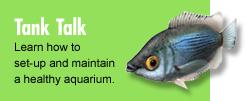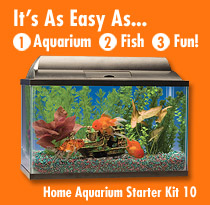Aquarium Fish Maintenance
Here you'll find the most commonly asked questions about aquariums and fish keeping. If you don't find the answer to your question here, you can e-mail us at TetraCare® or call at 1-800-423-6458.
- Q) How often do I feed my fish?
- A) You should feed your fish 2-3 times daily. The fish should eat all the food in 2 minutes or less. Overfeeding can cloud your water and harm your fish.
- Q) What do I feed my fish?
- A) What you feed your fish will depend on what type of fish you own. If you have tropical fish, they can eat TetraMin® Flakes, TetraMin® Pro Tropical Crisps, TetraColor, etc. Tetra has provided categories of food for specific fish. Goldfish, Cichlids, and Bettas have their own specific foods for their specific needs.
- Q) My fish has turned dark black or has its color washed out. What is happening?
- A) This could be a sign of stress. This is common for fish that have just been added to an aquarium. It can also happen when one fish is harassing another. Otherwise, test the water levels for ammonia, nitrite, nitrate, high pH, and incorrect temperature.
- Q) My fish has a cloudy looking eye, why?
- A) The cloudy eye could be an injury from netting the fish. You should treat the injury as a bacterial infection. You local store should have a medication available. If you have a UV clarifier, leave the ultraviolet light on to help prevent the spread of the disease.
- Q) My fish has torn or shredded fins, what can I do?
- A) It sounds like your fish has fin or tail rot. You should test your water for high ammonia and nitrite levels. This can lead to the disease. Treat this as a bacterial infection. You local store should have a medication available. If you have a UV clarifier, leave the ultraviolet light on to help prevent the spread of the disease.
- Q) My fish is covered in tiny white spots, like it has been sprinkled with salt. What can I do?
- A) It sounds like your fish has the parasite called Ick. This parasite is found in all aquariums. It normally cannot attach to the fish unless the fish is in poor health. You should test your water for high ammonia and nitrite levels. Your local store should have a medication available. Keep your aquarium lights off to disrupt the parasite life cycle. Increase your aeration and elevate your temperature to 85°F, at a rate of one degree every five hours until you reach 85°. Treat for 10 days.
- Q) My fish is darting around the tank and seems hyperactive. What is going on?
-
A) If you did not use Tetra AquaSafe® to remove the chlorine, the fish gills are being burned. This will cause the fish to dart around the tank. If it has been fewer than 24 hours since you added the fish, add Tetra AquaSafe® now. After 24 hours, the chlorine will evaporate out of the system, but the damage will already be done.
This behavior can also be caused by fish fighting. Make sure another fish is not harassing the distressed fish. If this is not the case, test the water levels for ammonia, nitrite, nitrate, high pH, and incorrect temperature.
- Q) Why is my fish scratching against the rocks?
-
A) This behavior could indicate a parasite. It may be Ick. This parasite is found in all aquariums. It normally cannot attach to the fish unless the fish is in poor health. You should test your water for high ammonia and nitrite levels. You local store should have a medication available. Keep your aquarium lights off to disrupt the parasite life cycle. Increase your aeration and elevate your temperature to 85°F, at a rate of one degree every five hours. Treat for 10 days.
It could also be gill or skin flukes. Ask your local retailer for a proper medication.
- Q) Why is my fish breathing rapidly?
- A) Rapid breathing could indicate a number of things. It could be stress from traffic in your home, or from a harassing fish. New fish will breath rapidly from the shock of being transported. You should also test your water for high ammonia, nitrate, pH, and nitrite levels. These can be toxic to fish and cause stress. Also check for parasites or disease.




